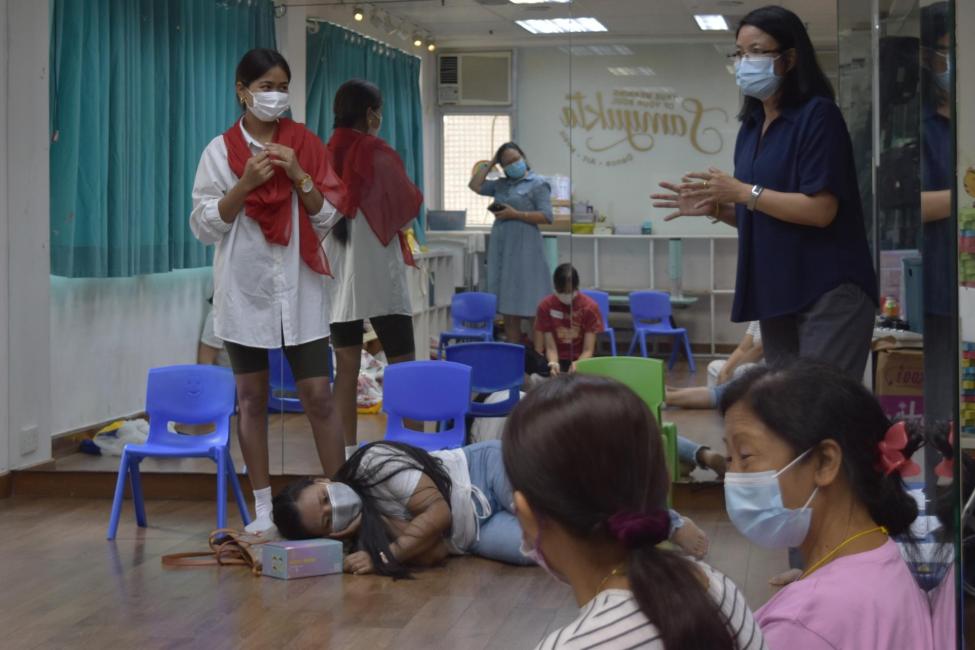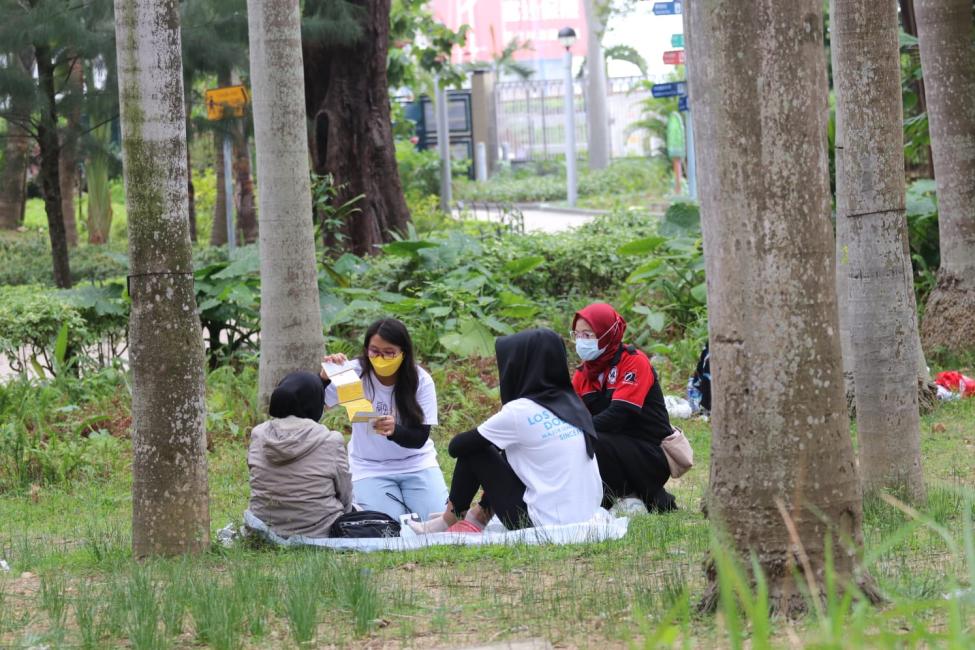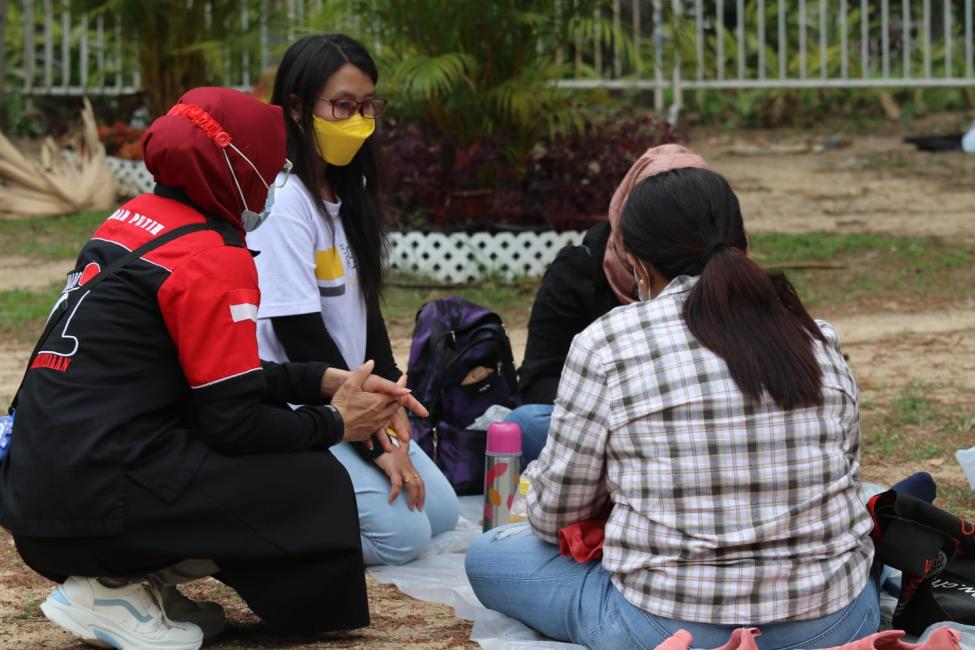
Migrant workers acted while telling their stories at the playback theater workshop. Photo: FADWU
25 October 2022, Hong Kong SAR, China - Chuni Thapa, founding member and chairperson of the Union of Nepalese Domestic Workers (UNDW) in Hong Kong SAR, China, cheerfully stretches on the floor of a dance studio with her friends, as they warm up for a workshop organized by members of the union.
The 50-year-old migrant, who first came to Hong Kong as a domestic worker in the mid-1990’s, took the initiative to hold playback theater workshops to provide health education, social activity and communal joy for migrant communities that have struggled with isolation and uncertainty during the COVID-19 pandemic.
The unique improvisation dynamics of playback theater allow domestic workers in Hong Kong SAR, China to share and understand each other’s experiences while processing their own emotions.
“We act, we feel, we speak, about things which have made us upset and angry, but also about what makes us happy. We understand each other’s stories a lot more because of the workshop,” Chuni says.
When migrant domestic workers arrive in Hong Kong SAR, China, they are often unaware that the circumstances of their employment, usually arranged by agencies or peers who act as brokers, might violate the law if the employer sets salaries below the minimum wage, withholds statutory leave, or confiscates the employee’s passport and identity documents.
“When I arrived in 1995, I was paid HK$1,800 a month when the minimum salary at the time was HK$3,700. I was only given two days off per month, but it is supposed to be one day every week,” explains Chuni. “I could not speak Cantonese or English, so I was not able to speak to many people about my situation.”
Eventually, Chuni learned about her rights from a friend and changed employers, with a full understanding of the protections granted under Hong Kong SAR, China’s employment laws. However, similar situations remain common among South Asian migrant workers in the city, and the strain of such conditions were considerably exacerbated during the pandemic.
Chuni wants people in migrant worker communities to easily connect with and understand each other, and she feels that playback theater is a highly effective medium for this purpose.

Migrant workers interpreted nonverbal displays of emotion of each other at the playback theatre workshop. Photo: FADWU
The workshop, which was supported by the International Organization for Migration (IOM) in partnership with Hong Kong Federation of Asian Domestic Workers Unions (FADWU), a union federation composed of local and migrant domestic workers unions of different nationalities in Hong Kong SAR, China, begins with a pair of activities in which participants mirror each other's movements, and interpret nonverbal displays of emotion. The activities then progress to thematic games involving generic settings and scenarios, such as a school and beauty contest, before the workers enact each other’s stories.
In one scene, Chuni and another participant, Sarah, act out an incident where an employer belligerently prohibits a worker from going out to meet their friends on their day off, insisting that they stay home because of the risk of contracting the coronavirus, and claiming that a box of masks costs them HKD300. Afterwards, the participants note that masks actually cost much less, and discuss how workers often have difficulty finding reliable information and obtaining essential needs.
Some of the scenes in the playback theater workshop are reimagined with different emotions, and alternative characterizations. In one scene, participants portray an abrasive employer as a “kind boss” instead, while other enactments emphasize that both employers and workers share the same anxieties.
“I myself was scared during the height of the pandemic, so at my employer’s request, I avoided taking public transport on my days off, and spent my time in the park near their home,” Chuni recalls.
This period was extremely challenging for workers, because they were deprived of social contact with their community under the two-person limit on public gatherings, which made outreach difficult.
As soon as the social distancing measures were eased, Chuni contacted a local playback theater group and rented a venue to organize a workshop for domestic workers, feeling determined to create an empowering experience for a new generation of domestic workers, while providing a way for them to come together as a community and learn about their rights.
“If we organized a seminar about COVID-19 where they would have to sit and listen, they would have gotten bored,” she says. “With playback theater we can dance and laugh together, and we feel very happy, like children dancing and laughing together. And we didn’t think we could act before, but now we discovered we are talented actors. I feel very grateful to IOM for supporting this event!”
Sharing knowledge and adding to the understanding of migrant rights and obligations is indeed important to improve the living and working conditions of migrants. In addition to the playback theater, this also can be done through fun and interactive online activities, like what Sherli, an Indonesian domestic worker, does.
Every Wednesday, from 10:00am to 11:00am in a Facebook live session dubbed “Wednesday Lessons”, the 41-year-old Sherli educates other migrant domestic workers in Hong Kong SAR, China about their rights and responsibilities. In her sessions, she discusses maternity rights, the importance of planned parenthood, how to engage in healthy romantic relationships, and how to access basic social amenities in Hong Kong during pregnancy. She believes that it is possible to achieve fair and equal labour rights for pregnant migrant domestic workers in the city.

Sherli actively engaging the migrant domestic workers community through one-on-one interactions at popular migrants gathering park. Photo: PathFinders
According to a report from PathFinders, an NGO that ensures the most vulnerable and unsupported children in Hong Kong SAR, China are protected and respected through empowering their migrant mothers, 250 migrant domestic workers in Hong Kong SAR, China face challenges of varying complexity every year when they get pregnant, due to a lack of information. This is made worse by the COVID-19 pandemic as social distancing measures are put in place and these women are not able to access the right support they need. Many have been forced to resign from their jobs, others have been subjected to maltreatment and often left to face the realities of being a new parent alone.

Sherli (2nd from left) decided to increase her knowledge about migrant domestic workers labour rights to help other women. Photo: PathFinders
As an active member of the migrant domestic workers community in the city, Sherli decided to increase her knowledge about migrant domestic workers labour rights to help other women, by taking the Pathfinders’ Train the Trainers Basic (TTTB) courses, which are supported by IOM. She is trained to educate other women on the importance of planned parenthood, love scams, and maternity rights so that they can put in place better plans for them and their children. Sherli and other training participants—called ‘ambassadors’—also take part in Client Support Programs to guide them to identify and support women who are already pregnant and need assistance to prevent them from falling into further crisis.
“By joining the training program of PathFinders and IOM, I can support more vulnerable migrants. When I do online or offline outreach, I always include my phone number. When they contact me, they first ask about maternity rights and protection. After I explain it to them, they tell me what happened to them in relation to their pregnancy and subsequently, I offer them relevant support,” Sherli says.
Despite the COVID-19 pandemic, Sherli has not relented in her efforts. She hosts events on zoom and has even expanded to other topics on visa status, self-love, healthy relationships, and overcoming stress, in collaboration with psychologists in Indonesia.
“Not even the social distancing measures can stop my outreach. Moreover, adapting to online activities is more efficient and saves energy. We had participation from migrant domestic workers within and outside Hong Kong SAR, China, and we also had students, teachers and other professionals participate from Indonesia. We were excited to take workshops on maternity rights and love scam in Hong Kong SAR, China to a wider audience,” she says.
Chuni and Sherli are the examples of how migrants can effectively support one another. Thus, with the right training, migrants are offering much needed support to these vulnerable migrants and helping to mitigate crises that would otherwise arise from lack of information. They are gradually becoming the foundation of trust on which a sustainable community outreach for all migrant workers will be built.
Under the framework of the Corporate Responsibility in Eliminating Slavery and Trafficking initiative programme, funded by the Swedish International Development Cooperation Agency (SIDA), IOM works in partnership with four local NGOs and one union federation in Hong Kong SAR, China to provide capacity building trainings and direct support to vulnerable migrant workers during the COVID-19 pandemic.
The story was written by Hong Kong Federation of Asian Domestic Workers Unions and PathFinders for IOM Hong Kong SAR, China sub-office
The opinions expressed in this publication are those of the authors and do not necessarily reflect the views of the International Organization for Migration (IOM).




















